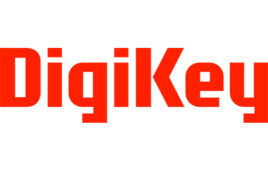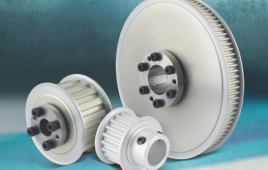 igus, the Germany-based manufacturer of motion plastics, announced a new line of polymer carriages for curved rails. The carriages are injection-molded from regranulated high-performance plastic and are cost-effective and sustainable. The new polymer carriages from the igus drylin® econ series make adjustment and positioning tasks simple and cost less than 20% of what their milled aluminum counterparts do. The carriages can even handle cornering on curved aluminum rails without any problems, thanks to movable bearings.
igus, the Germany-based manufacturer of motion plastics, announced a new line of polymer carriages for curved rails. The carriages are injection-molded from regranulated high-performance plastic and are cost-effective and sustainable. The new polymer carriages from the igus drylin® econ series make adjustment and positioning tasks simple and cost less than 20% of what their milled aluminum counterparts do. The carriages can even handle cornering on curved aluminum rails without any problems, thanks to movable bearings.
Linear motion guides that use steel rails and carriages with recirculating ball bearings are often over-engineered for specific applications. For example, moving a monitor for advertising in a shoe store or adjusting the gripper that transports snacks in a vending machine does not require high load capacities or precision guiding. However, design engineers frequently specify linear guides with mechanical capabilities beyond what is genuinely needed. This results in paying for unutilized performance.
Companies are looking closely at opportunities to reduce costs in today’s economic environment of high energy costs, supply chain disruptions, and high inflation. Using more cost-optimized linear guides that still meet functional requirements can be one way to cut expenses.
“We have therefore added a new, very cost-effective entry-level series called drylin econ to our linear guide product range,” says Michael Hornung, Product Manager for drylin Linear and Drive Technology at igus. “It’s ideal for simple adjustment and positioning tasks – including cornering.”
Costs for linear carriages reduced by around 80%
The new drylin econ series is a low-cost alternative to the previous linear guide in the igus drylin series. The secret to cost reduction is that the carriages are not milled from steel or aluminum but are injection-molded from high-performance plastic.
“This less time-consuming high-volume production in one casting reduces costs for a 0630-size linear carriage from €112 to €21 ($119 to $22), so design engineers save more than 80%,” says Hornung.
And drylin econ operation is also economical since no maintenance is required. This is due to the fact that microscopic solid lubricants are integrated into the high-performance plastic of the bushings over which the carriage moves on the rail. Unlike classic rolling bearings, they allow dry operation with no additional lubrication work. Therefore, users reduce maintenance time and material costs. These advantages make products that use the linear guide more economical and attractive. Last but not least, the system is exceptionally light.
“drylin econ uses plastic and aluminum, so it is suitable for many lightweight constructions,” says Hornung.
Carriage leans elegantly into curves on moving spherical balls drylin econ even allows movement around bends. igus produces both straight and curved versions of the anodized aluminum linear rails, allowing convex and concave curved guides and movement in quarter, half, and full circles. The polymer bearings for the carriage for curved rail adapt to the rail geometry with moving spherical balls.
“Even during cornering, movement is smooth, quiet, and rattle-free,” says Hornung. “This is especially important for vending machines, such as beverage machines in a hotel lobby, that are set up in public and intended to work as inconspicuously as possible.”
Carriages made of injection-molding production waste
The new carriages from the drylin econ series are not only economical to operate and low-cost but also sustainable. For injection molding, igus uses a regranulate called iglide ECO P, made entirely of injection-molding production waste, including sprue and defective parts.
“Recycling keeps the plastic from being burned,” says Hornung. “Instead, we regranulate it and feed it into the resource-saving, environmentally friendly circular economy.”
igus
www.igus.com
Filed Under: Uncategorized




